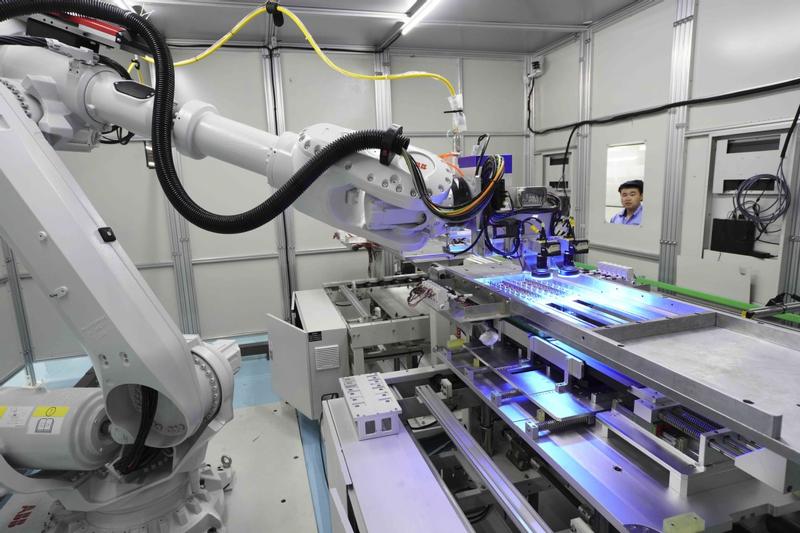 In this undated photo, an employee observes a robotic arm working at a smart production facility in Wenzhou, in China’s Zhejiang province. (SU QIAOJIANG / FOR CHINA DAILY)
In this undated photo, an employee observes a robotic arm working at a smart production facility in Wenzhou, in China’s Zhejiang province. (SU QIAOJIANG / FOR CHINA DAILY)
BEIJING – China will strengthen fiscal policy assistance to boost growth this year and will move steadily on delivering preferential tax and fee policies, particularly to struggling small businesses, an official said on Friday.
In response, experts said they believe such a policy stance will effectively lift the country's small businesses and consolidate the foundation for this year's recovery.
At a news conference, Zhu Zhongming, vice-minister of finance, spoke about China's recent decision to extend some preferential tax policies for businesses.
The move, he said, aims to strengthen small businesses, so they could leverage their role in the larger economy fully, in the context of innovation and this year's growth recovery.
We expect the policy extension will lower companies' burdens by more than 480 billion yuan per year.
Zhu Zhongming, Vice-Minister of Finance, China
The executive meeting of the State Council, China's Cabinet, on March 24 decided to extend some preferential tax policies to small firms and individual businesses until the end of 2024.
Zhu said according to the policies, small and micro enterprises as well as self-employed individuals will pay fewer taxes thanks to the new calculation method of taxable incomes.
"Tax and fee cuts are part and parcel of a proactive fiscal policy," Zhu said.
"The Ministry of Finance has studied and worked closely with competent authorities to ensure that preferential tax and fee policies are stable and consistent. We expect the policy extension will lower companies' burdens by more than 480 billion yuan per year."
Going forward, in the process of customizing fiscal policies, the ministry will holistically consider the need for both structural adjustment and aid to struggling businesses, Zhu said.
The current external environment remains volatile, and the foundation for China's economic recovery is not yet solid, with pressures coming in from demand contraction, supply shocks and weakening expectations, all of which remain significant factors, he said.
"To address these risks and challenges, it is necessary to step up the fiscal policy's macroeconomic adjustments," Zhu said.
Su Jingchun, an associate researcher at the Chinese Academy of Fiscal Sciences, hailed the decision to extend preferential tax policies to smaller firms and individual businesses, saying it is critical for this year's recovery.
"A thriving small-business community has a direct bearing in effectively spurring China's market vitality, energizing consumption and lifting households' disposable incomes. Small businesses also play an indispensable role in job creation," Su said.
"Tax and fee cuts aim to help these smaller businesses to benefit from the economic recovery and thereby survive and thrive. Their prosperity will also visibly contribute to growing consumption, a key fulcrum for boosting domestic demand this year."
According to the State Council policy, enterprises entitled to the current additional pretax deduction of 75 percent for research and development expenses are allowed to apply for 100 percent deduction and it will become a long-term institutional arrangement.
It will boost companies' confidence in building their innovation capacity and boosting their research capabilities, Su said.
Contact the writer at zhangyue@chinadaily.com.cn


